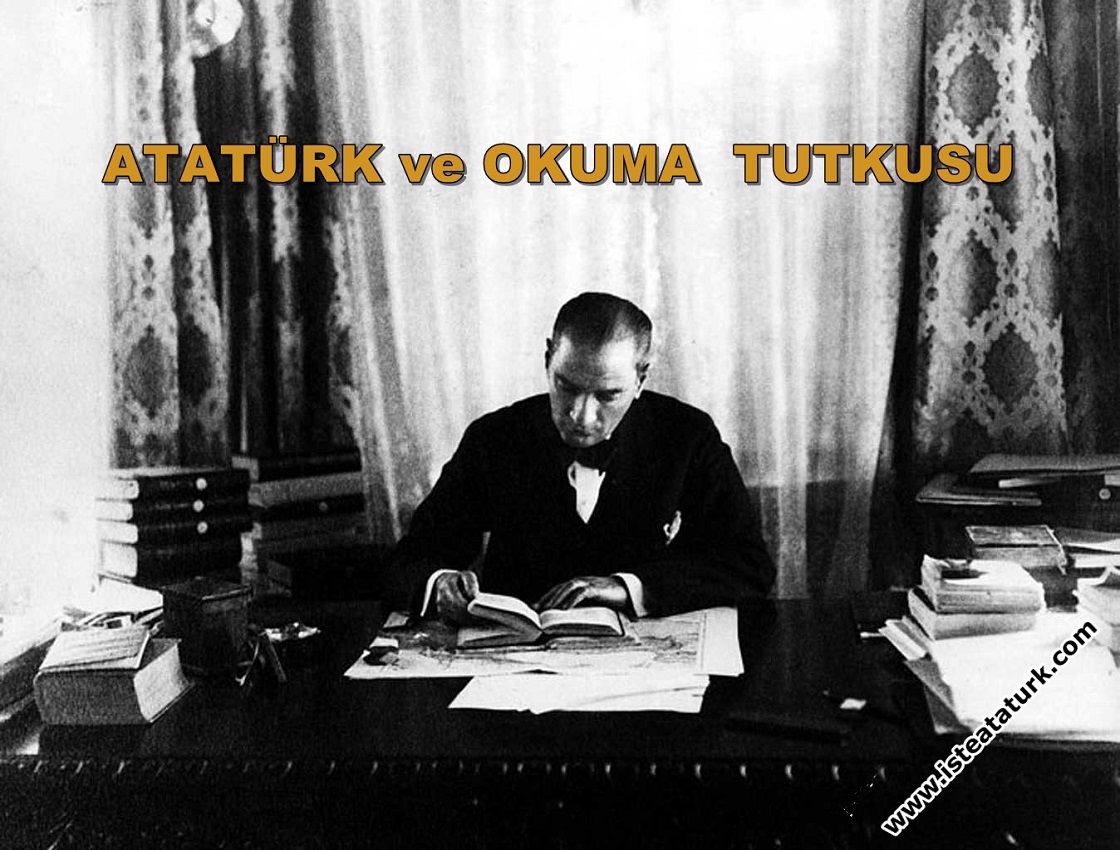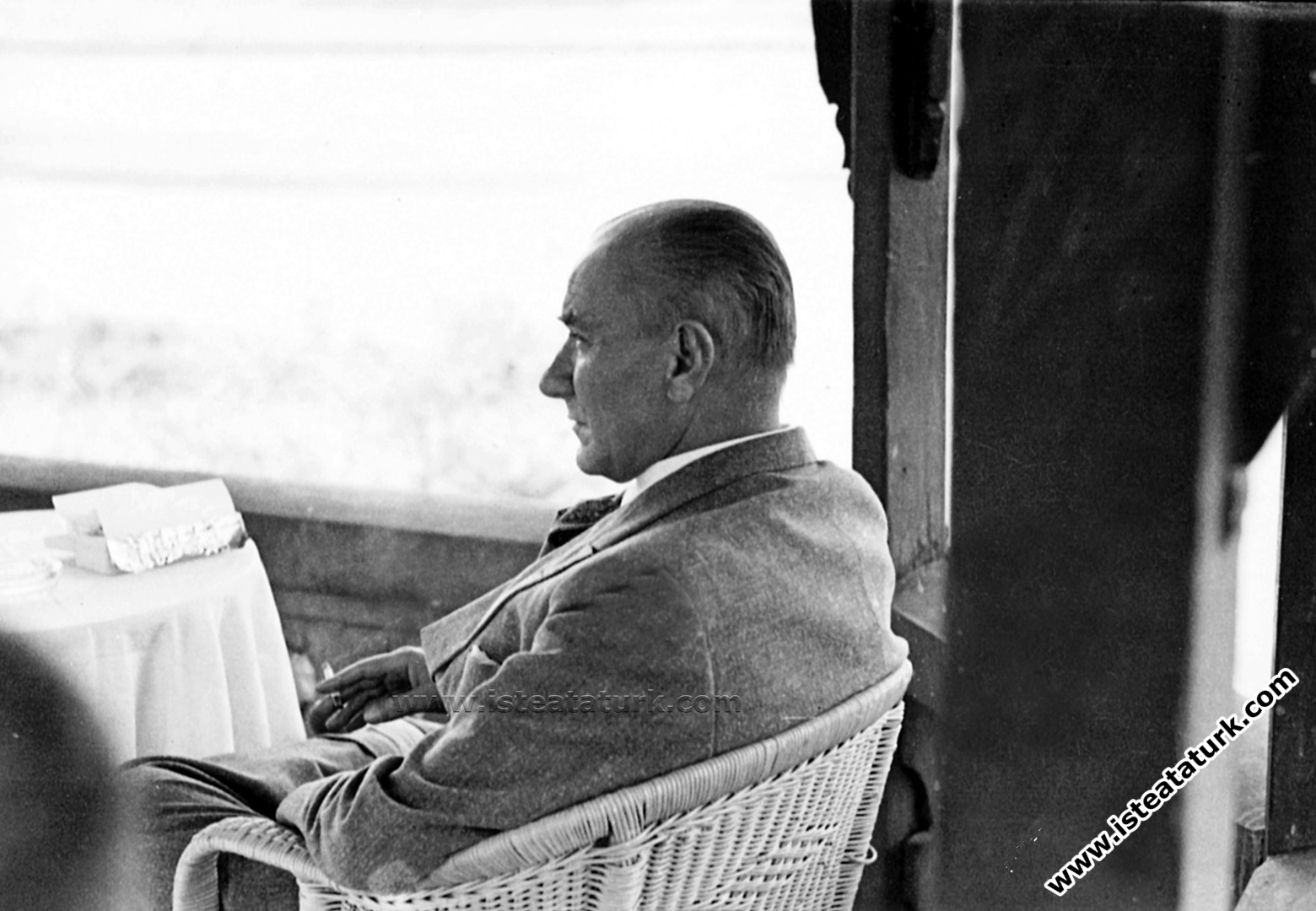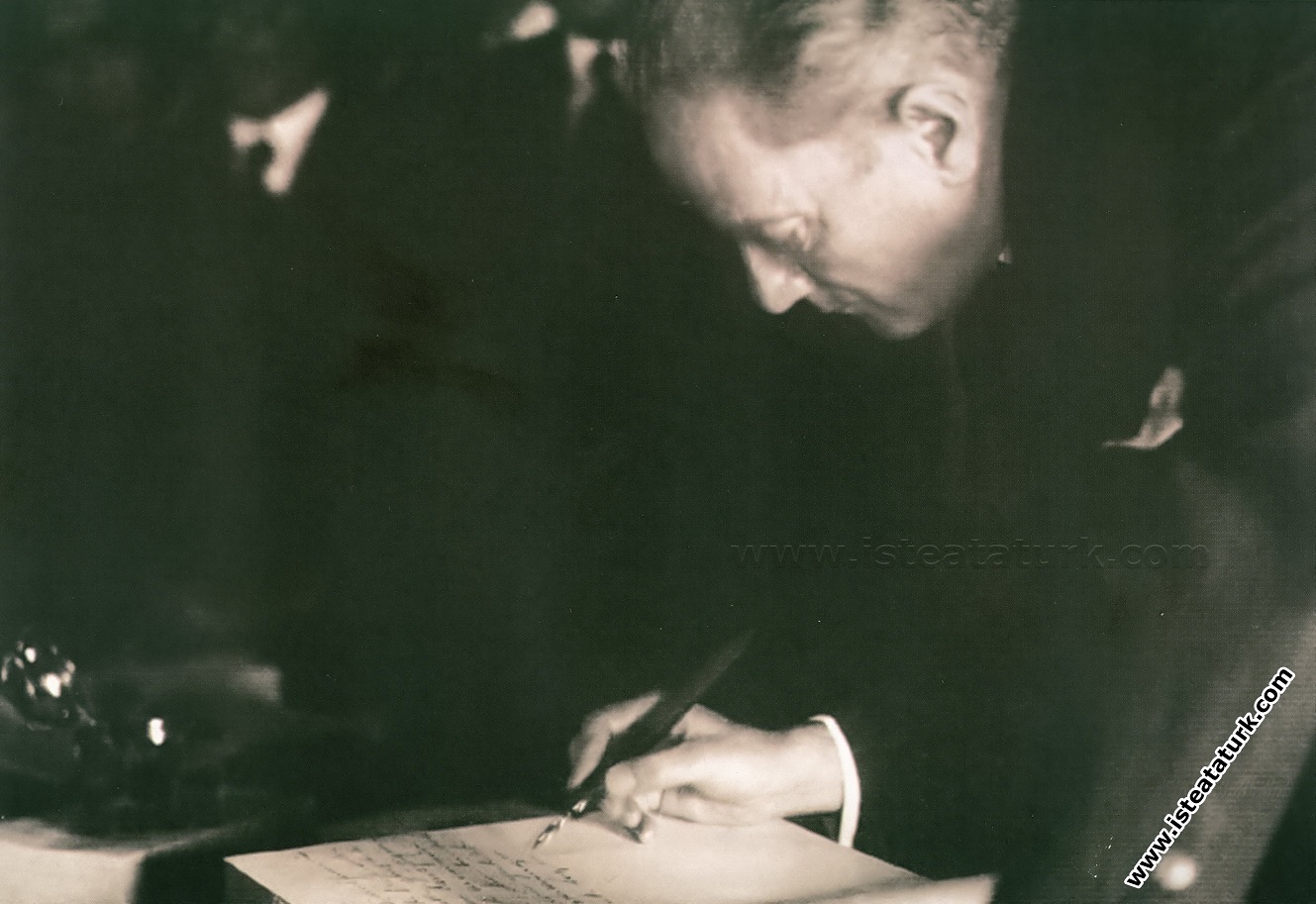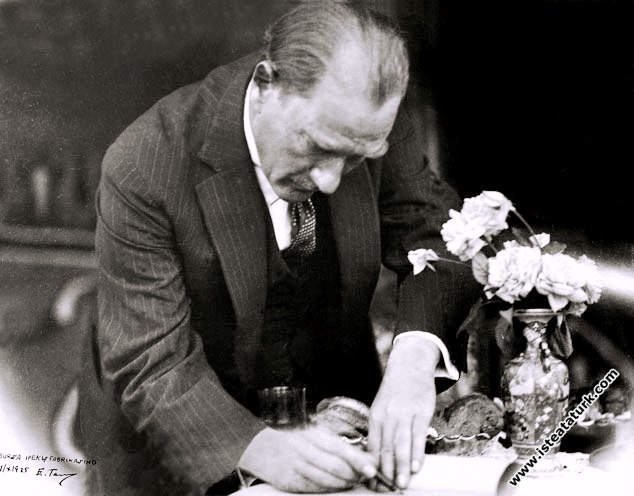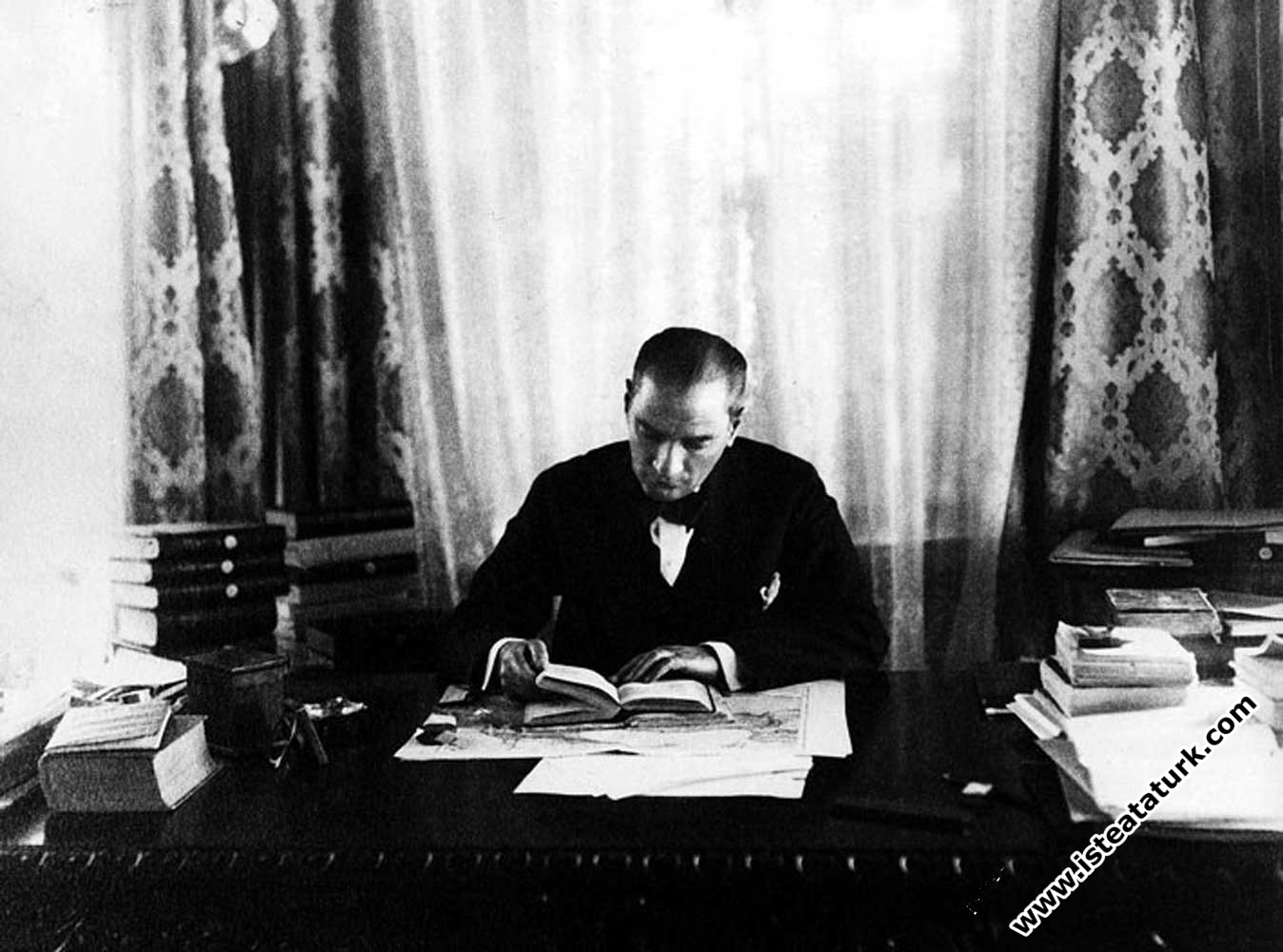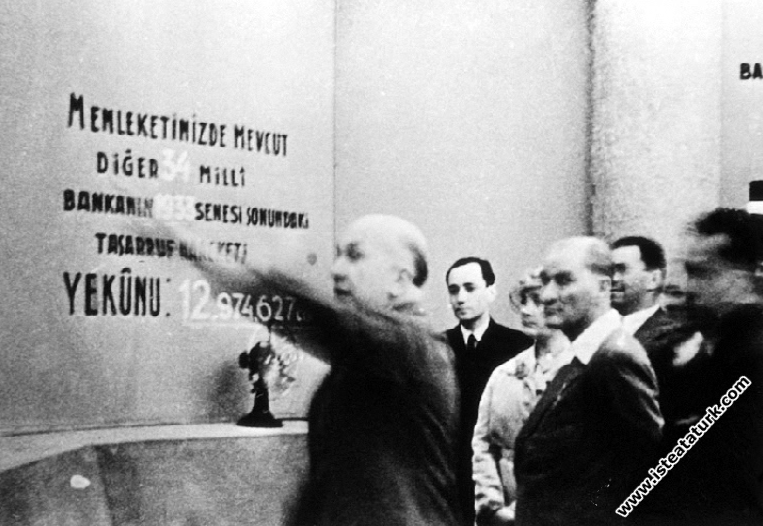
Education, Science and Technology in Atatürk
Character Size
"People and peasants warned me everywhere with these two words: the road and the school". (1924) Mustafa Kemal Atatürk
EDUCATION AT ATATÜRK - SCIENCE AND TECHNIQUE
— I —
One of the main indicators that characterize the underdeveloped countries is the lack of education and the low rate of literate people in the total population. In developed and developed countries, it is seen that this rate has increased, even reaching 100 percent. The relationship between economic development and education is clear and precise. Besides the importance Atatürk attached to education, the most striking feature is his insistence on the positive and indispensable effect of education on economic development. Adding the longing and desire of the people for the basic roles of infrastructure and education in economic development, he says:
“ The people and the villagers warned me everywhere with these two words: the road and the school. “ (1924)
Thinking about the impact of his own high personality, he says from time to time in the form of a personal longing to show the importance he attaches to education to those around him: “If I were not the President, I would like to get the Ministry of Education.”
The low literacy rate is shameful and shameful in Atatürk's eyes: “Imagine if ten, twenty percent of this nation, this social community can read and write, and if eighty and ninety percent are illiterate, it is a shame. We should be ashamed of this as a human being.”
Among the causes of the nation's backwardness, education is one of the most important: "I think that the education and training methods followed so far are the most important cause in the history of our nation's decline." What is expected from education? “It is education that either makes a nation live in the form of a free, independent, honorable, high society or it leads a nation to captivity and poverty. “Because: “It is certain that in the struggle for survival of a nation that will rapidly reach a high level in education, all its material and spiritual forces will increase. “(1928)
What should be the basic qualities of education, which is so important in the development of the nation?
“It is absolutely necessary to achieve victory in educational affairs. The real salvation of a nation is only in this way. To ensure this victory, we must all work on a concise program as one soul and one thought. I think the concise points of this program are two:
1 - It is suitable for the needs of our social life;
2 - Compliance with the requirements of the century” (1922)
He maintained this view until the end of his life:
“Our great cause is to elevate our existence as the most civilized and prosperous nation. This is the dynamic ideal of the great Turkish nation, which has made a fundamental revolution not only in its institutions but also in its thinking. We have to achieve this ideal as soon as possible and carry out thought and breakthrough together. Success in this attempt is only possible with a timed plan and the most intelligent work. For this reason, not to leave a single illiterate citizen, to train the technical staff required by the country's great development war and new roof, to create individuals and institutions that will understand and explain the ideology of the country's causes and keep it alive from generation to generation; to provide these important principles as soon as possible; These are the big and heavy obligations that the Ministry of Education has taken on.”(1937)
Atatürk, who wants these principles to be kept alive at all times and states that this is the main duty of universities and high schools, also explains the method and content of the education mentioned above and based on two main points:
"While we are trying to eliminate ignorance, on the one hand, the way of giving the country's children the first information in an applied way in order to make them active, effective and productive in social and economic life should form the basis of our education. It is a must. We will attach importance to the education of our women by going through a similar education level." (1922)
It is always at the forefront that the education should be practical and that the girls and boys who are educated should be skilled: “It is important that the education and training of our boys and girls at all levels of education should be working in the same way. Country boy should be equipped to be active, effective and successful in economic life at every education level. “(1924)
As it is known, there is a very close correlation (correlation) between the rapid economic development and development and the predominance of vocational and technical education, especially in the secondary education structure. The insistence of this close connection in the above words is really interesting.
The student alone is meaningless. There is a need for a teacher to train the student. The student-teacher are the elements of a whole. The judgment of Atatürk, who wanted to make teaching “a profession suitable for progress and probably to ensure prosperity” reaches important dimensions: “It is teachers and only teachers who save nations. A nation devoid of teachers and educators has not yet acquired the ability to take the name of a nation."
— II —
The level of economic development and development is related to the scientific and technical development that the country has and can use. The source of technical developments is scientific developments. For this reason, scientific development reaching a certain level always gives the same result and produces the same technical invention (invention) in any country. Technical inventions are by no means accidental. It is quite common for countries that are close or equal to each other to make the same invention at the same time.
The view that economic development and development can occur after scientific development gives birth to technical development is common. Famous economists Colin Clark and French Jean Fourastie put forward in the theory of "three sectors or segments" that the greatest driving force in economic development and development is technical development and that the level of countries is determined accordingly. A country with nearly eighty percent of the working population in the agricultural sector and ten percent of the other industrial and service sectors is a typical underdeveloped country. With the application of technical development, the working population is first transferred to the industrial sector and then gathered in the third sector. With developments in this direction, eighty percent of the working population will be in the third sector in the national economies of the next centuries. today's countries,
We can also find the important influence of science and technology in the structures of economic systems. Although it is possible to determine the common points of both systems in the field of application, it is not possible to reconcile the two major systems as a common point in the theoretical plan, with only one exception. Using an advanced technique and mechanization is the only common point adopted by both systems and manifested in the theoretical plan. While all these reminders reveal the decisive role of science and technique in the development of the country, they also explain its universal nature. The basic rule and aim at Atatürk is to be contemporary. The way to this is through science and technique:
“The most real guide for everything in the world, for civilization, for life, for success, is science and technique.” After the war of independence that lasted for three and a half years, he recommends working in these areas and focusing on these: "After this struggle that lasted three and a half years, we will continue our struggles in terms of science and education - We will be factory workers, we will be artists - From now on, we will always give our understanding to this." (1922)
“Science and technique will be our guide in our nation's political and social life and in our nation's education of thought. We cannot close our eyes and assume that we live alone - We do not enclose our country in a circle and live indifferent to the world - We will take science and technology from wherever it is and put it in everyone's minds. There is no registration or condition for science and technique. “(1922)
In the first government program he established, Celâl Bayar meticulously states that Atatürk's password in economic affairs was to work with the most advanced technique and in the most efficient way. He is adamant in this matter: “The nation has firmly decided to accept the standard of living and means of today's civilized nations, in content and form, as they are. “(1925)
Which nations are civilized? East or West?
“The understanding of civilization in the East evaluated the material and spiritual world events with the view of religion. As long as this concept of civilization lived, development and prosperity could not be achieved.”
Although the nations are separate, the world of civilization is one. It is necessary to participate in this world, to live in this field of civilization. So: “A nation cannot be shown that desires to enter civilization and does not turn to the West” In all these words, it is possible to identify two great features: First, to be contemporary, to reach the level of contemporary civilization, The civilization world of the era is the West. However, one point needs to be clarified here. Atatürk was not a Westerner. His aim was modern civilization. The fact that some people interpret themselves as Westerners because of their adoption of the West as the civilized world is the result of ignoring this important feature.
The second feature is that while he was determined to "accept the standard of living and means of civilized nations as they are in content and form", he also gave the first signs of the various revolutions that he would realize.
— III —
When Atatürk's working method is examined closely, it is seen that the problem has been matured after a long preliminary study and a solution with a radical character has been reached at the last stage.
One of Atatürk's most distinctive qualities, perhaps the first, is his realism. However, this realism does not only apply to the possibilities and conditions of a particular situation. It also activates the time factor and directs its behavior and attitude by spreading over time zones. In this respect, characterizing Atatürk as a "master of timing", which is based on realism but has a broader scope, can be considered a well-founded statement.
On this subject, years later, at the conference he gave at the Faculty of Languages, History and Geography of Ankara University, İsmet İnönü spoke very clearly (1960): “I would like to openly declare that Atatürk did not force anything in the economic field through revolution. This non-compulsion is not a coincidence, but the result of care. It is the result of Atatürk's ability to make a harmonious distinction between the works that will be done immediately and the works that will be left to develop in time.”
This distinctive feature that makes up Atatürk's personality is his realism. All his life, he has never played to surprise. This was also the case in the university reform, and the basic quality of his working method and personality was fully demonstrated. The fact that the university law came into being in a seemingly sudden night is actually the result of long preliminary studies. There is no haste and superficiality. Namely;
— The convening of the Teachers' Congress in 1924 is the first indication of the importance to be given to all education and training.
— The sending of students abroad, which was included in the decisions taken by the Turkish Economy Congress convened in İzmir in February 1923, was put into practice.
— Foreign faculty members were brought in and investigations and researches were conducted on the university.
— In the letter of thanks he wrote to the Istanbul Faculty of Letters for the "honorary professorship" award, Atatürk used the term "faculty" meaningfully twice, even though it was named "Darülfünun Literature Madrasa".
— And again, very meaningfully, a conditional appropriation for "Darülfünun" was included in that year's budget.
The university reform was thus made as a synthesis of past experiences, contemporary trends and a comprehensive understanding of science stemming from realism, and was put into practice overnight.
Prof. Dr. Yüksel Ülken
Kaynak: ATATÜRK ARAŞTIRMA MERKEZİ DERGİSİ, Sayı 12, Cilt IV, Temmuz 1988
